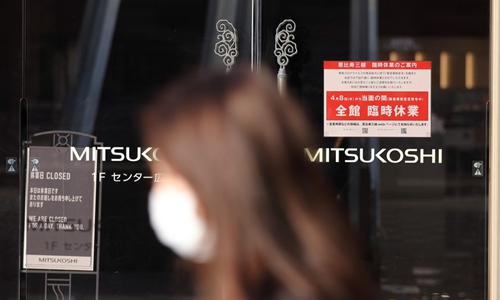Amid COVID-19, negative factors dictate Japan's attitude toward China
By Da Zhigang Source:Global Times Published: 2020/5/16 15:03:40

A woman wearing mask passes a closed department store in Tokyo, Japan, April 8, 2020. Photo: Xinhua
China-Japan relations are striving hard in the battle to prevent and control the novel coronavirus.
This effort has involved cooperation and enthusiasm among various politicians, members of the business and economic community, and direct people-to-people links.
It is well established that COVID-19 has challenged every country's sense of awareness, healthcare practices, economics, security, and balances of global diplomacy.
Against this backdrop, Japan has adjusted its approach with China while walking a fine line with the ramped up China-US rivalry.
Three major trends deserve close attention in this process.
First, Japan is reducing its industrial plans in China and encouraging industries to relocate home to Japan. Due to the pandemic, Japan's government and its economic community are aware of the importance of economic security and stable industrial and supply chains. This has led many analysts and policymakers there to reexamine the advantages and disadvantages of their industrial structure that is heavily reliant on China.
Mounting chorus of domestic voices in Japan are calling to slowly open their market to China, and shrink their current export-oriented dependency. Many of these policies have been promulgated. More are in the pipelines.
At the 36th Council on Investments for the Future held at the Prime Minister's Office on March 5, Japanese Prime Minister Shinzo Abe said, "as for those products with high added value and for which we are highly dependent on a single country, we intend to relocate the production bases to Japan."
Bloomberg reported in April that Japan has proposed a $2.2 billion economic stimulus package to assist Japanese manufacturers to shift production out of China. Although the Japanese government cannot fully determine the will of Japanese companies in China, it will seek a variety of reasons to persuade them to return home.
Second, Japan is reshaping its conservative regional coordination agenda and prioritizing its own interests in economic and trade cooperation.
Emphasizing regional coordination has always been an important approach for Japan to promote internationalization, adhere to multilateralism, and expand free trade zones.
Japan has proposed ground-breaking ideas on regional economic cooperation. It has signed the Comprehensive and Progressive Agreement for Trans-Pacific Partnership, is promoting the Regional Comprehensive Economic Partnership (RCEP), and is an active partner for the China-Japan-South Korea Free Trade Agreement (FTA).
Nevertheless, as the epidemic develops in Japan, certain circles are calling for more conservative and contracted paths for regional coordination and consolidating investment for domestic industrial security. They'd like to see Japan's economic and trade interests served first at home.
For example, Japan's Ministry of Economy, Trade and Industry is planning to entice semiconductor companies Intel and the Taiwan Semiconductor Manufacturing Company (TSMC) to move their core semiconductor and key accessory facilities to Japan.
This also shows that Japan will be more conservative in terms of economic relations with China. For instance, Japan will work hard to prevent cutting-edge enterprises from being acquired or merged. The country will also fill its domestic industrial void by pushing Japanese companies in China to serve Japan's industrial arrangements.
Of course, Japan won't seek a "Japan First" policy akin to the "America First" policy of the US.
Nor will Japan give up its decade-long investment and future goals with China. Japan will keep promoting the RCEP and the China-Japan-South Korea FTA. But for future negotiation and cooperation with China, it will add more preconditions that benefit Japan's interests.
Third, Japan will construct a diversified investment model and be more vigilant of risks in its cooperation with China. Since China and Japan normalized relations in 1972, there have been ups and downs in their relations. This will serve as a criterion for China to judge Japan's overall strategy toward China.
In the wake of the COVID-19 pandemic, global pattern and globalization are changing fast. This has made Japan aware of the evolving nationalistic sentiments in the US and Europe. It has also taken serious stock in realizing China's unstoppable influence. Consequently, Japan has become anxious. It also support the island of Taiwan's inclusion in the World Health Assembly.
To ease its anxieties, Japan may increase its investments in Southeast Asia and South Asia, preparing for its possible "de-Sinicization" in the future.
The author is director and research fellow of the Institute of Northeast Asian Studies at Heilongjiang Provincial Academy of Social Sciences and chief expert at the Northeast Asian Strategic Studies Institute. opinion@globaltimes.com.cn
Posted in: VIEWPOINT,OTHER REGIONS